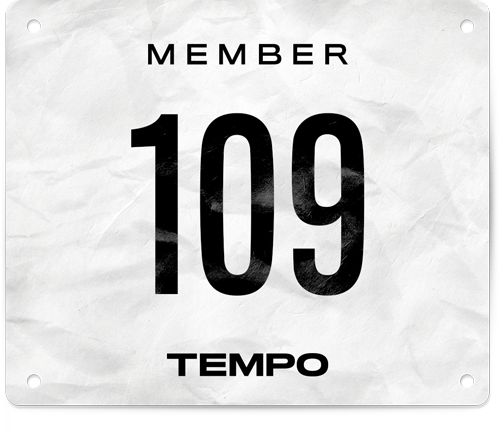Performance
On the Loss of Running
Rethinking Injury
Dave McNeill is more than a Tempo columnist; he's a three-time Olympian, a physiotherapist and a run coach. Catch him writing for us every couple of months – here he asks whether we need a healthier, more holistic attitude to injury.
Running means many things to many different people. For some, it’s a means to an end. For others, it has a meaning all of its own, bringing a measure of understanding and connection to our lives. Each of our relationships with running is unique and complex.
As run-specialty brands, creative visionaries and community-minded people fuel a running renaissance, the emotional bonds we each have with the sport are evolving. Running is no longer simply about performance metrics or physical fitness. It is no longer simply about entering a race and pursuing a goal. Of course, it never has been just about these things. But until recently, very few outlets or communities existed to promote running as a pursuit we have a relationship with, and through which we feel connected.
Running, increasingly, is an outlet to experience connection with one another. To weave social and cultural fabrics. To be inclusive rather than exclusive. To not feel alone. Running also increasingly plays a role in understanding and nurturing our own mental health.
Unfortunately though, running is never guaranteed. Despite the complexity of our relationship with it, and the meaning we garner from it, running is still a simple and repetitive task. It’s simplicity and repetitiveness make us vulnerable to physical breakdown. Do any one thing enough and overuse can often be the consequence. Running is no exception.
The sources of connection, health and wellbeing are diverse, but the buck rarely stops with the run. If running is lost, consider what other vehicles can get us where we need to be.
Dave McNeill
Even though running has undergone a renaissance, how we approach running injuries is still very much done through a performance and physical health lens.
We traditionally explore strength, biomechanics, diet and any changes in the amount or type of running, and then try to correct these factors. There is nothing wrong with this approach, and it remains necessary.
However, for the role running has in our experience of connection, mental wellbeing, and overall balance, what are we doing to nurture these dimensions in the face of injury?
Perhaps it is time we reconsidered injury, too. Not simply as a prompt to restore function, but instead to restore our relationship with the run.
As with the loss of, or challenge to, any relationship, grief and anxiety commonly make an appearance. We can become disconnected with the present moment and become consumed with questions of the past and future: “Why did this happen, and how do I restore it?” Many of us risk tying our sense of identity to running, and so we’re liable to question who we are when we can’t run.
If all we do is address injury through a physical health lens, what impact does the accompanying experience and feeling of loss have on our road to recovery? What impact does it have on the rest of our lives? Are we really addressing all that’s at stake when we can’t run?
If you’ve experienced, or are experiencing a running injury, perhaps go beyond considering the part of your body that physically hurts and nurture your relationship with running and yourself. Here are four places to start, which don’t involve massage or lifting weights:
Reorder and reconceptualise your response to injury
For so many runners, the first response to injury is, “What do I do?” Doing and striving are hardwired into our social and cultural psyche. We go; we don’t stop. We tell ourselves fixing things is about action, not inaction. We keep poking and prodding, when sometimes, things just want to be left alone.
So often with running injuries our mindset is self-preservation: we attempt first to preserve our fitness by any means necessary … by running through the early warning signs or replacing the run with something similarly strenuous. But, in the simplest terms, running injuries are the body’s way of saying we’ve overdone it and we need to slow down.
Stopping and tuning into your breath is a better place to start than tuning straight into the mind’s incessant questioning of “what to do, what to do?!” Stopping and tuning into your breathing allows you an opportunity to reorder and reconceptualise your thoughts.
Think first about rest and recovery before self-preservation. Both are important, but it is usually the rest and recovery that is sacrificed. Better to bring it to the forefront of our consciousness.
And, if you replace the run with something that doesn’t irritate your injury, reconceptualise why you are doing it. If we expect it to maintain our running fitness, we will only be left disappointed, and with an additional source of anxiety to contend with. Think of it as an opportunity to explore connection – within, and with, the world – in a new and unique way.
Pay attention to your thought patterns
Dealing with injury can be an anxious experience. Whatever your relationship with running, we all lose something when we can’t run. A daily outlet. That goal race. Our chance to connect with our people.
Our mind can be incessant in questioning the how and why.
If you can, take notice of what thoughts pop up – how your mind gets from point A to point B. Write it down if it helps. Then ask yourself, do your thoughts serve you? Do they prompt a response that centres you? Or do they exacerbate a sense of being overwhelmed, of worry and anxiety? If you’re experiencing negative thoughts, your next task is to recognise them every time they pop into your head, take a deep breath, and let them pass. It’s not about eliminating these thoughts. It’s simply a matter of not fighting them, which often can only stoke that sense of being overwhelmed.
Look more holistically at the sources of stress in your life
If running injuries occur because of a disruption of the balance between stress and recovery, to only look at the physical stress of running as the lone culprit is to ignore the complexities of being human.
No stress in our life occurs in a neatly contained silo. When our health and wellbeing is challenged in some way, it is overly simplistic to assume, for example, that running injuries result only from running. Our experience of health and wellbeing is an intricate connection between so many different factors. And so, our experience of health and wellbeing in our running can be impacted by any number of other stressors in our life – be they from work, a relationship or some other activity in our lives. When planning your path to recovery, consider more than just the run. Nurture your health more holistically.
Nurture wellbeing in other ways
When running is lost, it’s easy to assume that the pathway to connection, health and wellbeing is lost completely. We attribute running whole-heartedly to our experience of certain physical, mental and spiritual states. Our relationship with running is often one of identity, so losing running can feel like we’ve lost ourself. We can be left feeling helpless.
Often though, the sense of identity we experience on the run comes not from the running itself. The running is just a vehicle to exploring that sense of self, and there are many other vehicles we can find to get there.
For many, running is a vehicle for immersing in nature, and it is nature through which we feel connected and well. We need not run to experience nature.
For others, running is a vehicle to social connection. We can still connect with others without running.
For others still, running is meditative and ritualistic; it provides a certain flow state for our mental wellbeing to flourish. And while other outlets may not be as potent, there are many ways in which to experience the flow state. Be that meditation, yoga, walking or cycling.
The sources of connection, health and wellbeing are diverse, but the buck rarely stops with the run. If we lose running, we should consider what other vehicles can get us where we need to be.
If we are to find a sense of gratitude and a silver lining to the loss of running, it is that the loss provides an opportunity to reconsider our relationship with it – to stop, slow down and listen to our bodies, to consider the other dimensions of our life from which we garner connection, health and wellbeing. Running usually comes back, and injury provides an opportunity to build a healthier relationship with it. Shift your mindset the next time you’re injured, and use it as an opportunity to heal more than just the physical injury.


